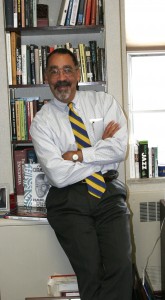
Vice President Dean Burgett, although not retiring, is planning to reduce his administrative role as of July 1. Courtesy of Drue Sokol, Photo Editor.
“Pruning and fertilization.” Those are the words University Vice President and Dean Paul Burgett used to characterize his recent decision to reduce his administrative role — Burgett will be stepping down as general secretary as of July 1.
“I’m cutting away some of the underbrush … so that I can focus, at this stage in my life, more carefully on fewer things rather than on a million different things,” Burgett said. “I think this is a normal, healthy thing for me to do, and the president has supported me in my efforts to do so.”
President Joel Seligman is expected to recommend current Chief of Staff to the President Lamar Murphy as Burgett’s replacement. Assuming this transition is approved, Burgett’s current staff will keep their current jobs but work under Murphy instead of Burgett.
Everyone involved in the decision is quick to emphasize, however, that Burgett will continue to have an extremely strong presence on campus.
He will retain his titles of vice president and senior advisor to the president and dean, in addition to continuing to be a liaison to the community, teaching and advising students.
“More than anything else, I want to stress that [Paul] is not retiring, but rather beginning a new chapter in his illustrious life,” Seligman said.
Burgett offered similar assurance.
“I can’t imagine not doing those things. I can’t imagine not participating in the life of the University in ways that continue to add value,” he said.
Most of Burgett’s responsibilities as general secretary currently revolve around keeping the records and organizing the affairs of the Board of Trustees. As an example of the immensely complex logistics involved with this position, Burgett discussed how he and his staff have to organize meetings among many trustees from across the country — some of whom are a part of as many as three sub-committees — without having any overlap between them.
“You keep adding things, but you don’t necessarily divest yourself,” Burgett said of the responsibilities he had accrued as general secretary.
According to Burgett, he has been having conversations with President Seligman for the last two years regarding the best way to alter his administrative role in order to make more time for family, travel and other emerging interests.
“Many months ago [Paul] began a conversation [with me] about him cutting back his time commitment to give him and Kay, his wonderful wife, more time together,” Seligman recalled.
Burgett cited several other factors that also played into his decision, including the desire for more time to pursue his growing interest in the history of the University and wanting to maintain strong connections with the multi-generational network of alumni.
The point at which he first started considering a revised role, however, came about three and a half years ago, when his wife retired after 32 years as a professor.
“With that, I was able to see how the pruning and fertilizing freed her up to [get more involved academically],” Burgett remarked. That unquestionably had some influence on me, as I watched her life change for the better. That got the wheels turning, and it’s been a slow, evolutionary process since.”
Although his demeanor doesn’t reflect it, Burgett did express a twinge of anxiety about the change in his life and career, comparing it to the situations faced by freshmen, graduating seniors and young professionals.
“I’m always saying to students, ‘What you’re going through is entirely normal.’ Well, now it’s happening to me,” he said with a laugh. “It’s a little scary.”
Despite these apprehensions, Burgett acknowledges that his greatest personal challenge in taking on the new role will simply be “not allowing the weeds to fill back in,” so that he doesn’t “end up getting back to doing the same old stuff.”
Burgett also admits that, beyond this initial role restructuring, the future is something of a mystery.
“This is the next step,” he said. “What the step is beyond that I don’t know. In the same way that the graduating senior that takes his or her first job, they don’t know where that’s going to lead. In that sense it’s kind of an experiment.
“My ambition with this transition is to continue it indefinitely. And so indefinitely means that there’s no end date that I envision,” he continued. “Of course we all have an end date when they put us six feet under, but how I will think of things in two years or three years, I don’t know. I’ll have more information on the basis of how things evolve. It’s my intention, however, to continue at the University in this slightly reshaped role indefinitely.”
According to Burgett, however, much of this change will go under the radar as far as the University community is concerned.
“The University world doesn’t think of me as the general secretary — I’m Dean Burgett,” he said. “I expect that this transition will be largely invisible.”
So to all the advisees who cherish Dean Burgett’s advice, the community members who enjoy his talks and the trustees who couldn’t live without those handwritten birthday cards every year, fear not — the same old Dean Burgett will still be here, just with a slightly modified role.
Fleming is a member of
the class of 2013.




